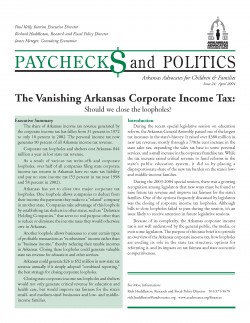
During the recent special legislative session on education reform, the Arkansas General Assembly passed one of the largest tax increases in the state’s history. It raised over $380 million in new tax revenue, mostly through a 7/8ths cent increase in the state sales tax, expanding the sales tax base to some personal services, and a small increase in the corporate franchise tax. While the tax increase raised critical revenue to fund reforms in the state’s public education system, it did so by placing a disproportionate share of the new tax burden on the state’s low- and middle-income families.
During the 2003-2004 special session, there was a growing recognition among legislators that new ways must be found to raise future tax revenue and improve tax fairness for the state’s families. One of the options frequently discussed by legislators was the closing of corporate income tax loopholes. Although bills to close loopholes failed to pass during the session, it’s an issue likely to receive attention in future legislative sessions.
Because of its complexity, the Arkansas corporate income tax is not well understood by the general public, the media, or even some legislators. The purpose of this issue brief is to provide an overview of the Arkansas corporate income tax, how loopholes are eroding its role in the state tax structure, options for reforming it, and its impacts on tax fairness and state economic competitiveness.
